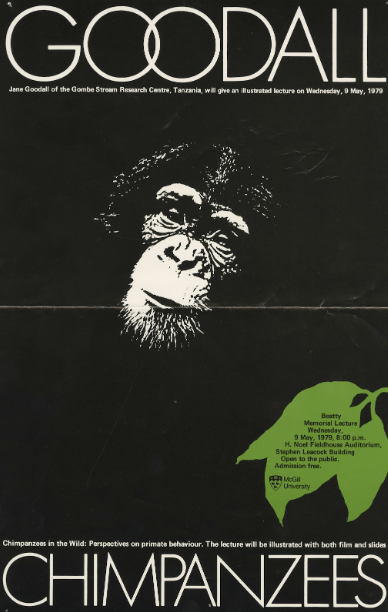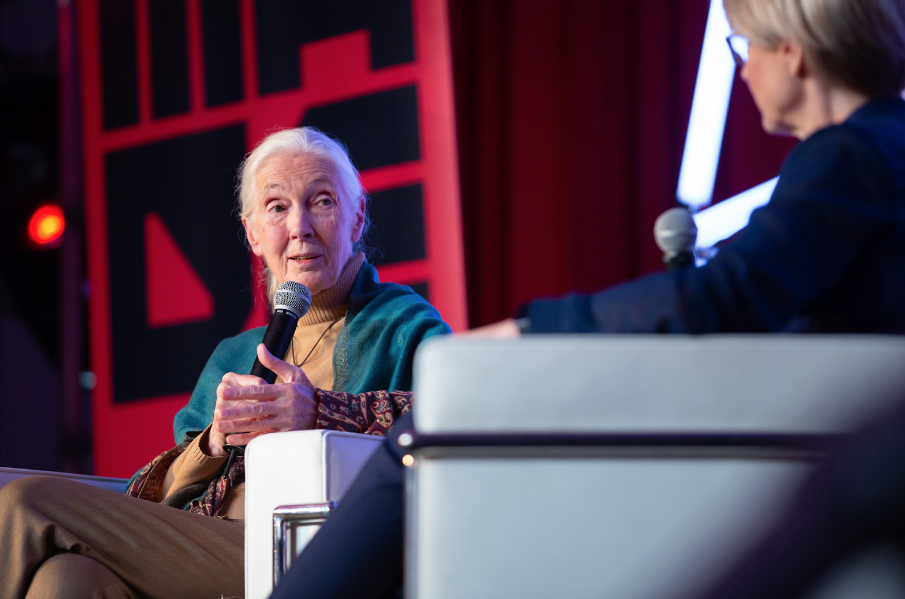Jane Goodall began her second Beatty Lecture as she did her first: By saying hello to the audience in “chimpanzee.” Goodall, best known for her work in studying African chimpanzees and her later humanitarian and environmental activism, spoke on Sept. 26 at the 65th anniversary of McGill’s Beatty Lecture series.
It had been forty years since Goodall visited McGill in 1979 to give her first Beatty Lecture. Then, still an up-and-coming researcher, Goodall was invited to present a portion of her ground-breaking work on the complex behavioural dynamics of wild chimpanzees. At the time, the event’s organizers feared that she would not draw a large enough crowd to fill a lecture hall. They ended up needing an extra room for the overflow of people waiting to hear her speak.
This year, speaking to a sold-out crowd of 1,200 people, Goodall recounted the beginnings of her scientific career—a journey that took her from the shores of England, to Kenya, and finally to Tanzania, the now famous site of her chimpanzee research.
Goodall knew from the start of her investigation that chimps held the key to understanding human evolution; they were a vital link between ape and man.
“The thing that was so striking [to me] was how alike the chimps are to us,” Goodall said. “[Their] postures and gestures of communication, they are the same as ours […] kissing, embracing, sometimes holding hands, begging for food, using tools in many situations.”
Before Goodall, the world knew very little about chimps, their highly diverse social networks, and their close evolutionary proximity to humans. But with Goodall’s research, the scientific conception of evolution was forever changed.
“I could spend hours out in the rainforest,” Goodall said. “Sometimes with the chimps, sometimes, just out there in the forest […That] is where I learned about the interconnectedness of all living things, and how each species, no matter how small or insignificant they may seem, has a role to play in this wonderful tapestry of life that we call biodiversity.”
Goodall recalled that it was during that period that she began her lifelong mission of protecting chimpanzees from the dangers of human interference. All around her, she began to see the adverse effects that deforestation, population growth, and destructive agriculture had on chimps.
After attending a 1986 conference about chimpanzee evolution, Goodall was struck by the conditions in developing countries, seeing parallels between the plight of chimps and that of local communities in Africa.
“It hit me then […] How can we even try and save the chimps when people are living and struggling to survive?” Goodall said.
Goodall’s speech quickly turned from saving the chimps to tackling issues at the heart of worldwide humanitarian and environmental crises, work that has defined the latter half of her life so far.
“Most people understand the problems of the planet, but don’t do anything because they don’t know what to do,” Goodall said. “And that’s why the most important message is that each one of us can make an impact every single day. We can make a choice as to what we buy, where it comes from, and if it harms the environment.”
Though Goodall admitted that we live in a time that poses exceptional challenges, she offered the audience an optimistic perspective.
“I’ve seen so much suffering and destruction,” Goodall said. “But my main reason for hope remains with our young people, because when we listen to their voices and empower them to take action, as you know, they can and are changing the world.”

The exhibition “With the world to choose from: Celebrating 65 Years of the Beatty Lecture” is on now at the Rare Books and Special Collections on the fourth floor of the McLennan library. The interactive exhibition gives onlookers a glimpse into the history of the Beatty Lecture including a closer look at some of the world leaders, best-selling authors, and Nobel Prize winners who have graced the Beatty Stage.






